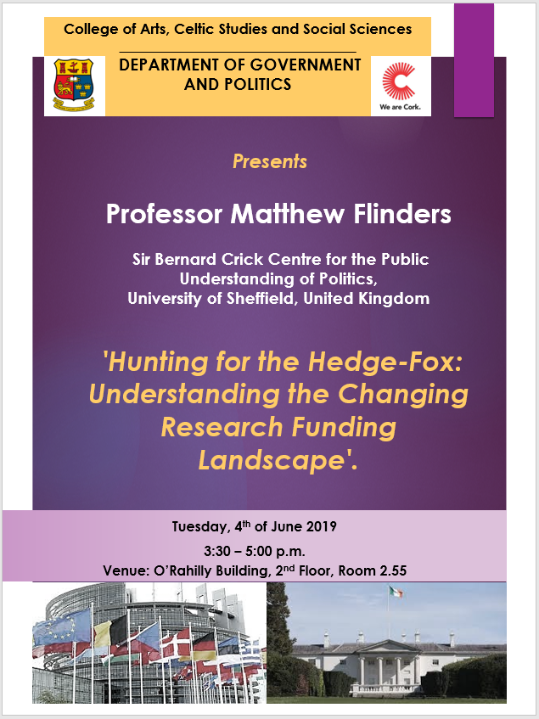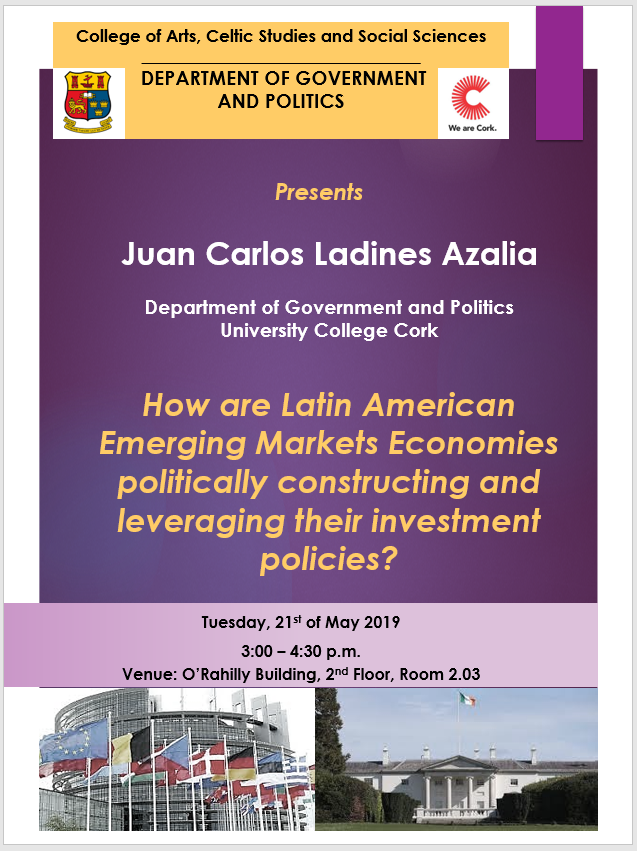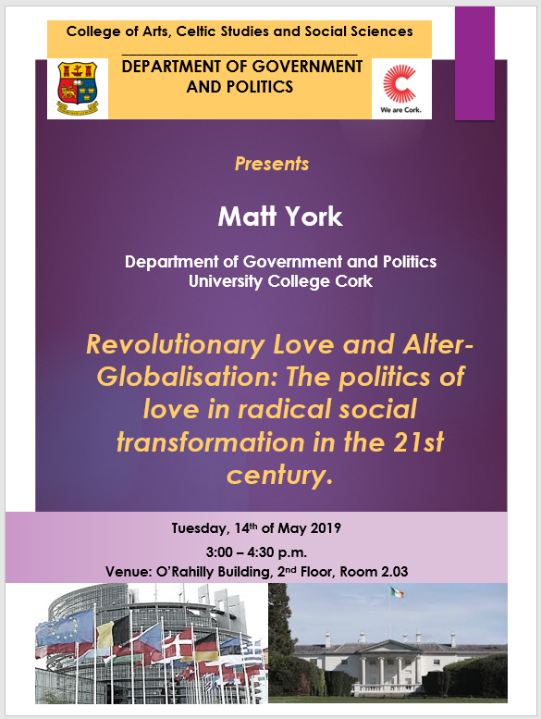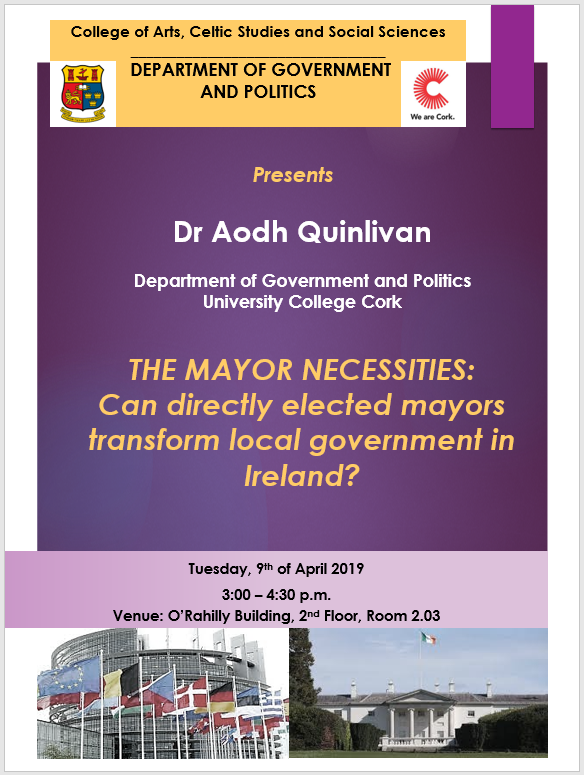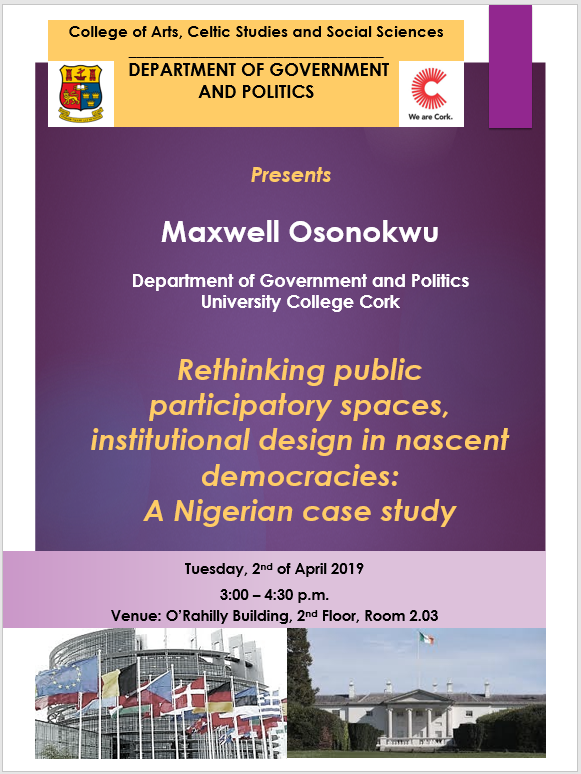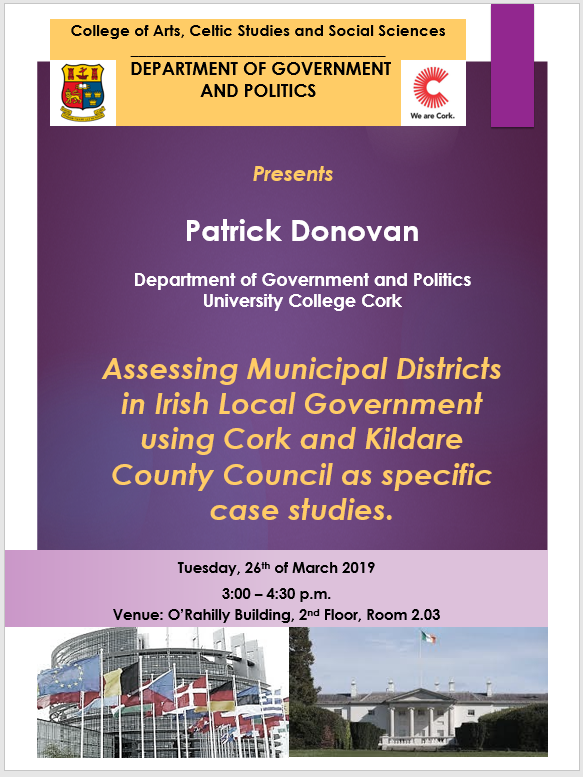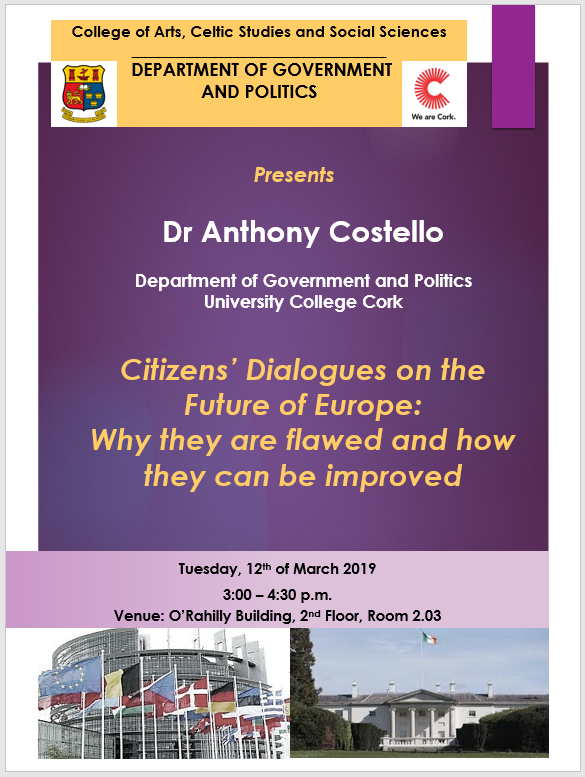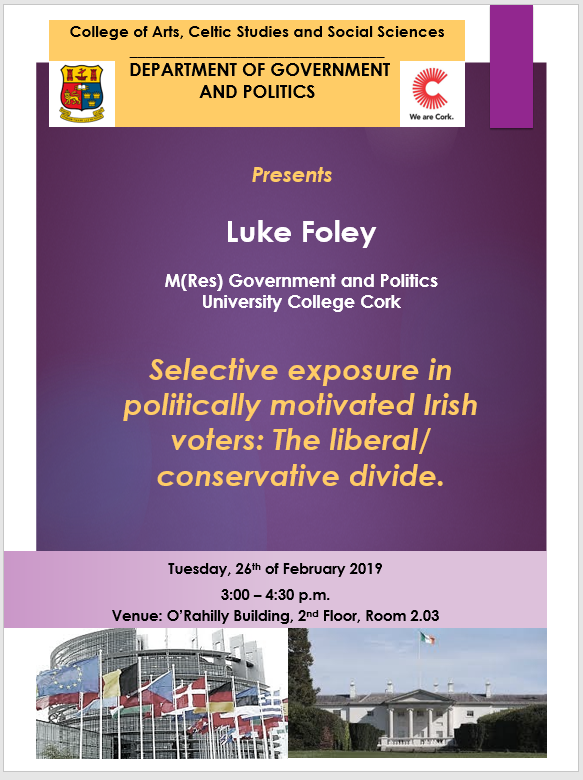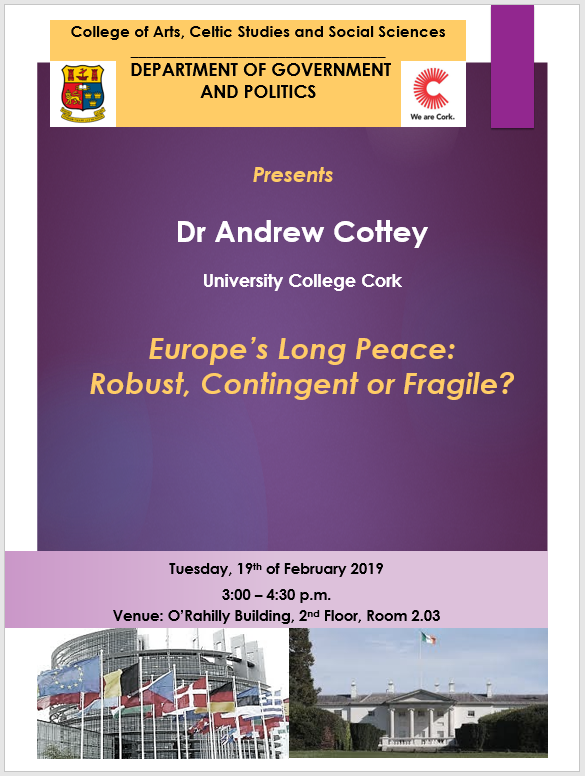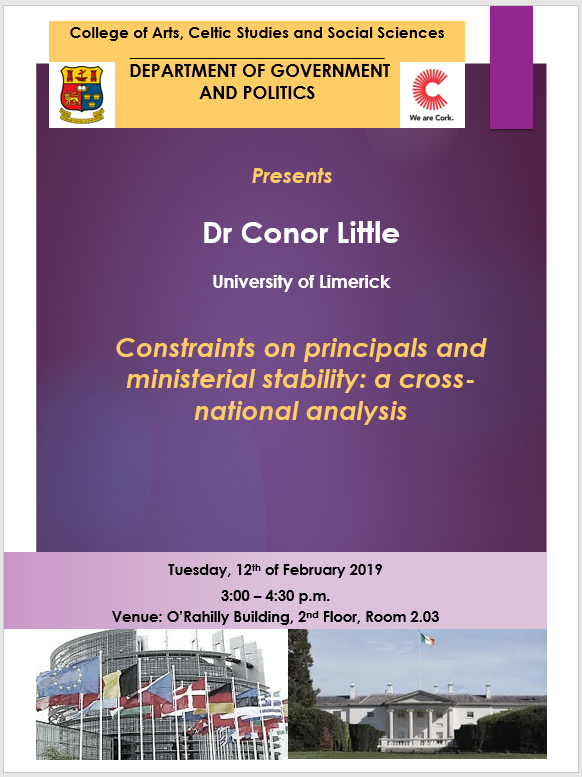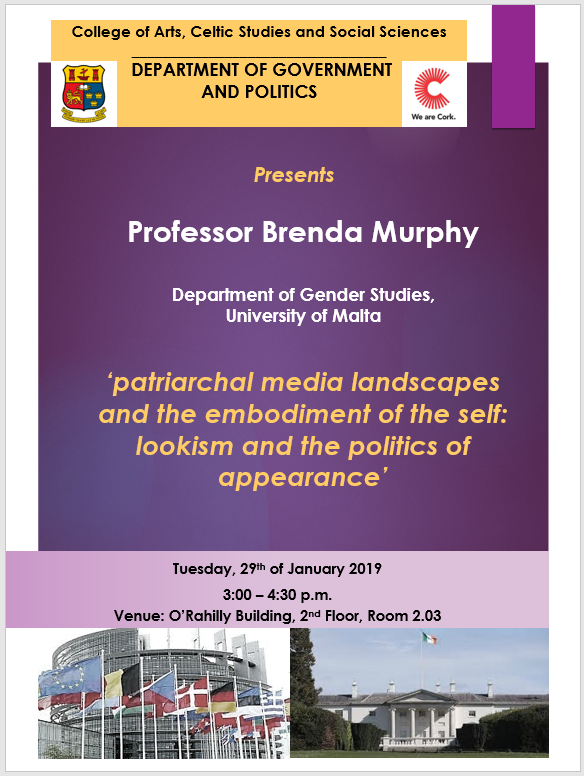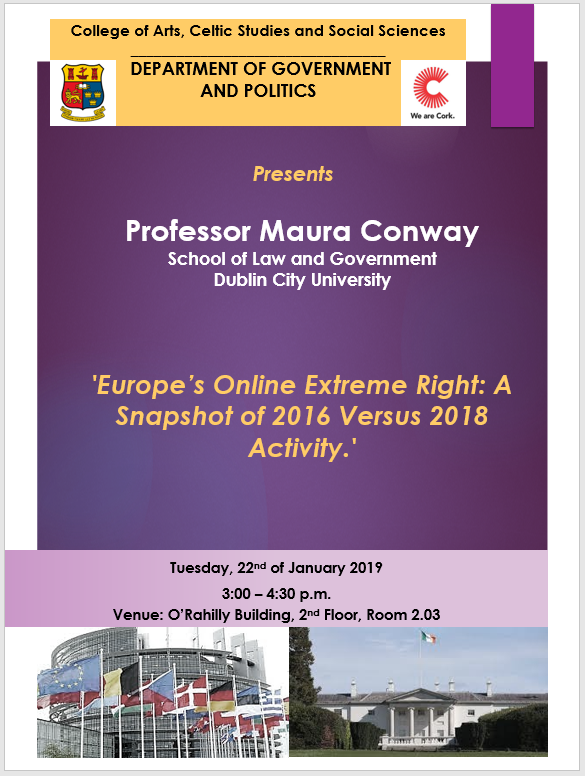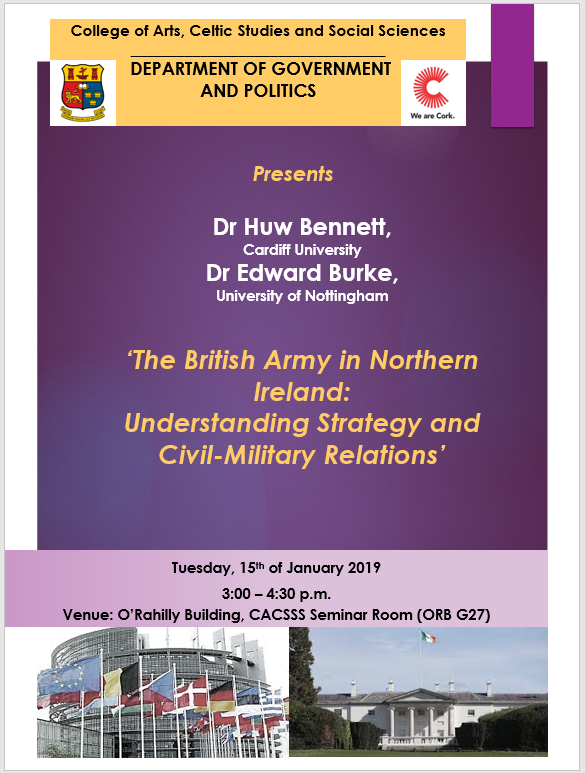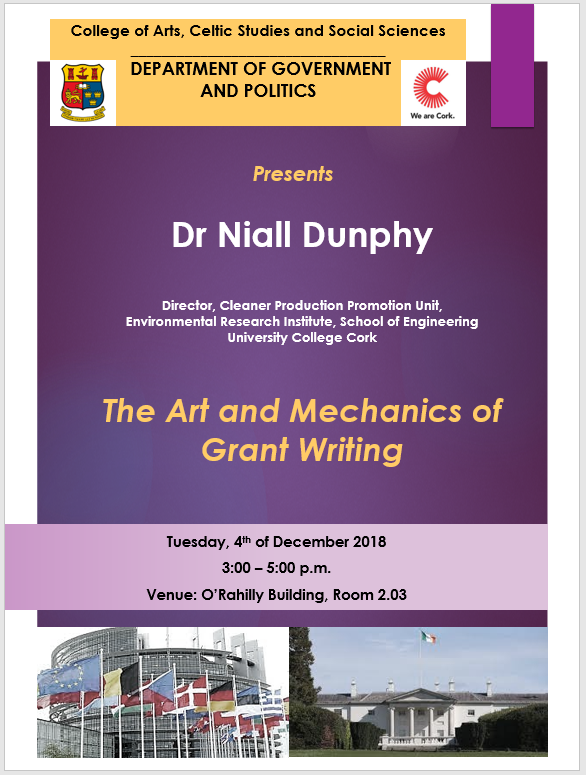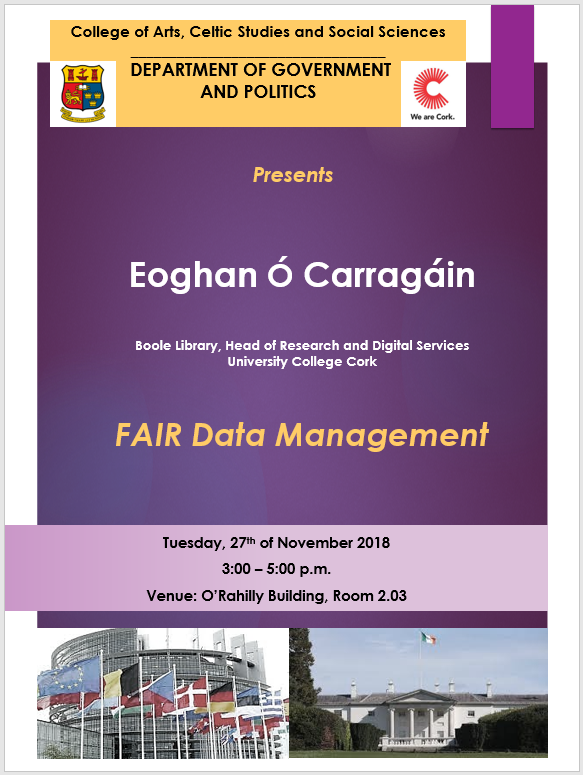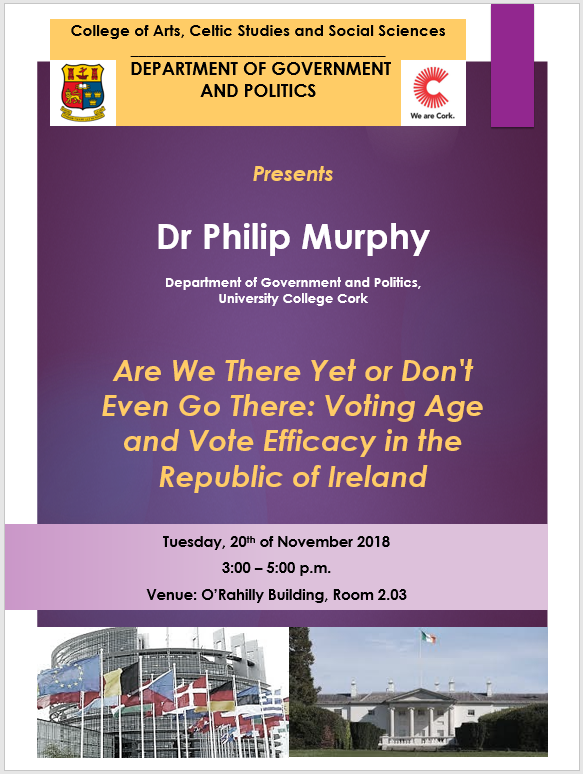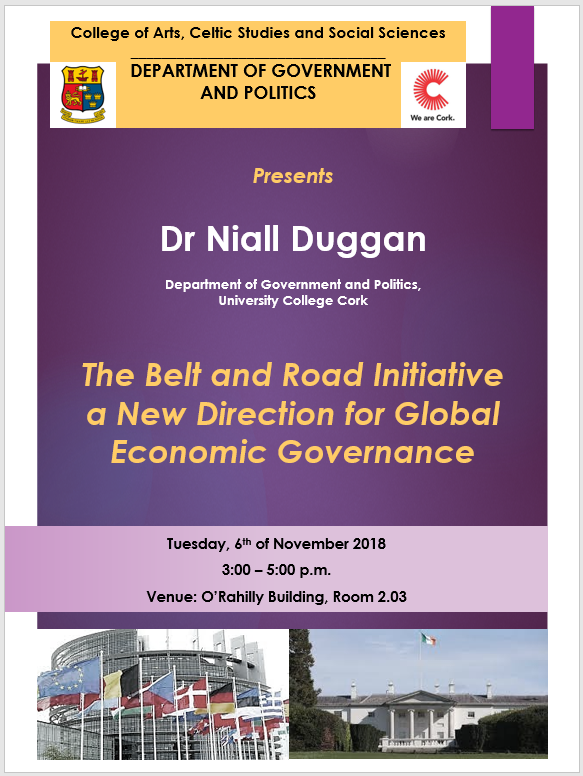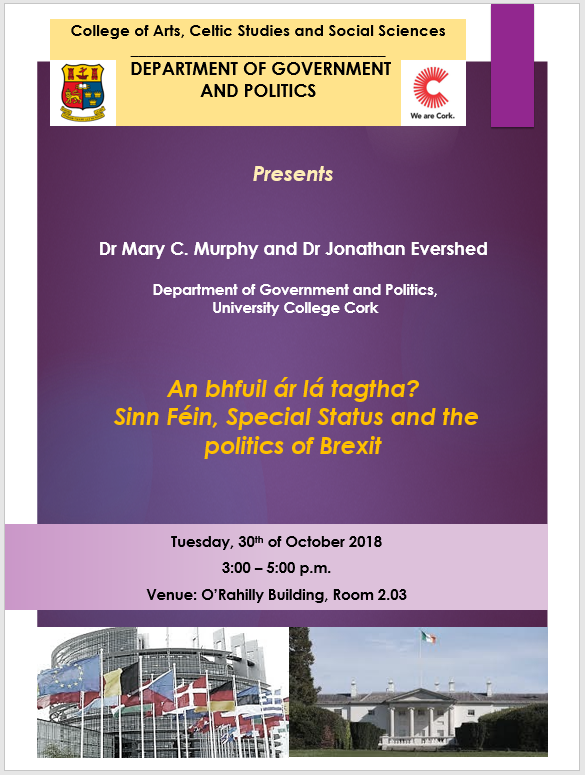In This Section
- Home
- About the Department
- Undergraduate Study
- Postgraduate Study
- Research
- Work Placement
- Our Staff
- Contact Us
- News
- Centre for Local and Regional Governance
- Archive
- Hub in Active European Citizenship
Professor Matthew Flinders (University of Sheffield), "Hunting for the Hedge-Fox: Understanding the Changing Research Funding Landscape."
Matthew Flinders is Founding Director of the Sir Bernard Crick Centre for the Public Understanding of Politics and Professor of Politics at the University of Sheffield. He is also President of the Political Studies Association of the United Kingdom and sits on the Economic and Social Research Council within the newly established United Kingdom Research and Innovation (UKRI). He has also written and presented a number of documentaries for the BBC - the most recent being 'MPs Expenses: Legacy of Scandal' which was broadcast to wide acclaim in May 2019.
In this seminar, he will talk about the changing research funding landscape and the changing expectations that are being placed upon academics. His core argument is that the nature of 'being an academic' in the twenty-first century is in a state of flux and that academics might be well advised to develop a more proactive political strategy that avoids the obvious traps while also seeking to realise the indisputable opportunities that currently exist. This is an argument that provokes a wide-ranging conversation about clunky institutions, self-evident truths and the need to protect the mental wellbeing of academics from a widening 'expectations gap'.
Juan Carlos Ladines Azalia (UCC), "How are Latin American Emerging Markets Economies politically constructing and leveraging their investment policies?"
Emerging market economies (EME) are significant actors in the global economic system. While this statement could refer to China as the new economic powerhouse, the concept of EME can be applied to different geographical and economic areas. The literature has addressed the importance of EME's economic growth based on inward investment and export-oriented policies, where the economic criteria have prevailed over political aspects in the policy design. This research focuses on the less explored field of Outward Investment Policies, which for EME is a recent phenomenon for these kinds of economies.
In this area, Latin America presents as the emerging region that has under-developed an outward perspective based on government capabilities. This has been underpinned by weak political institutions, creating a lack of consistency and poor political coordination in the construction and shaping of investment policies. This political scenario contrasts with the emergence of Multinational Corporations - “Multilatinas” as a new economic actor in the region. This opens the discussion on how these new actors interrelate within their governments under a political scope and contribute to design Outward Investment Policies.
Dr Matt York (UCC), "Revolutionary Love and Alter-Globalisation: The politics of love in radical social transformation in the 21st century."
The ascendancy of neoliberal globalisation has increased inequalities, injustices, and violations of freedoms on an unprecedented scale, creating a fertile environment for the rise of far-right xenophobic nationalism and authoritarianism, and accelerating our descent towards irreversible ecological collapse. In parallel, a series of movements challenging global capitalism have responded with a growing popular resistance to neoliberal policy and practice. The experience of social movements over the last century confirms the pressing need for a framework of plurality within this current movement wave which avoids the dominations and hierarchies of previous structures, maintains its constituent diversity, and yet allows for the construction of a cohesive collective identity.
Throughout the twentieth century, there are many examples of political actors revolutionising love to align with specific political and social ideals of freedom, but as a subject of enquiry love has caused a significant amount of academic anxiety to date. Within contemporary theory generally the subject of love has usually evoked an embarrassed response with the topic suggesting a conservatism and a denial of politics. In recent years, however, an albeit small number of anarchist political philosophers, feminist theorists and social movement theorists have explored whether love can be utilised as a useful key concept for a new political theory of global revolution.
This seminar will explore this concept of Revolutionary Love with reference to an ongoing collective visioning project which is currently exploring the thoughts, feelings, ideas and imaginings of a cross-section of activists internationally, in relation to love in this specific modality. The project aims to (co)theorise (and plan to operationalise) a revolutionary love for the 21st century through the synthesis of existing theoretical perspectives within the academy and the movements, and the themes generated by activists through the research project. Participants include activists from South Africa, Mexico, Trouwunna (Tasmania, Australia), Ireland, UK, Syria, Uganda, Germany, Canada, the Netherlands, Turkey, USA, Jordan and Afghanistan, with movement engagement including anti-capitalist/alter-globalisation activism, radical environmental activism, indigenous rights activists, anarchist activism, feminist activism, local organising and training, food sovereignty projects, transformative economies, cooperatives and permaculture projects.
The collective visioning utilises utopia as process – transitioning the functionality of utopia from noun to verb, and operationalising imagination as a productive power in the pursuit of new knowledge and praxis. The process aims to facilitate ways of being activists which escape the usual political certainties - approaching politics as research, while simultaneously inventing new forms of theorising outside of conventional academic procedures – displacing the usual researcher/object bi-polarity in favour of a more inter-subjective methodological approach.
Dr Aodh Quinlivan (UCC), "THE MAYOR NECESSITIES: Can directly elected mayors transform local government in Ireland?"
Ireland legislated for directly elected mayors (DMEs) as far back as 2001. The new system was meant to come into effect with the local elections of 2004. It never happened. Other attempts to introduce DEMs were made by John Gormley in 2008 and Phil Hogan in 2014. Both efforts failed. The issue is on the agenda once again in 2019 and, on 24 May, the people of Cork city (not county), Limerick and Waterford will be asked to vote in plebiscites on whether they want a DEM in their area. In the meantime, a Citizen’s Assembly in Dublin will discuss the issue for the capital city. Minister John Paul Phelan has stated that there is a ‘democratic deficit’ at the top of local authorities; it is his belief that DEMs will inject ‘a massive dose of democracy into local government’. While there will be a rebalancing of powers between a local authority’s Chief Executive and the DEM, the bigger issue is the urgent need for a realignment of the central-local relationship.
Maxwell Osonokwu (UCC), Rethinking public participatory spaces, institutional design in nascent democracies: A Nigerian case study.
Studies have shown that most Africans prefer to live in a democracy since the early 1990’s the number of democracies have been on the increase; most continuously struggle with the practice of democracy and have been labelled as either defective or nascent democracies. A global catalogue of innovations aimed at deepening democracies by involving citizens is on the increase. A focus of this study is to examine the ‘carved-out space’ that enhances citizen participation in decision-making processes at the local level of governance. This approached is seen as a bridge between the formal (Colonial, post-colonial), and the informal traditional (pre-colonial) political institutions.
Patrick Donovan (UCC), "Assessing Municipal Districts in Irish Local Government using Cork and Kildare County Council as specific case studies."
Municipal Districts came into effect in 2014 following on from the local elections that May. They were first announced through the Putting People First policy paper published by the Irish government in 2012. Relatively new and with very little written about them my research is aiming to discover how Municipal Districts are working as a structure of Irish local government. To do so I am using the democratic and economic purpose of local government to benchmark how Municipal Districts are performing. By conducting interviews with elected members of Cork and Kildare County Councils I hope to get a further in-depth understanding of Municipal Districts.
Anne Gannon (UCC), "Institutional Change In The Irish University 2008-2014: An Examination Through The Lens Of Institutional Logics".
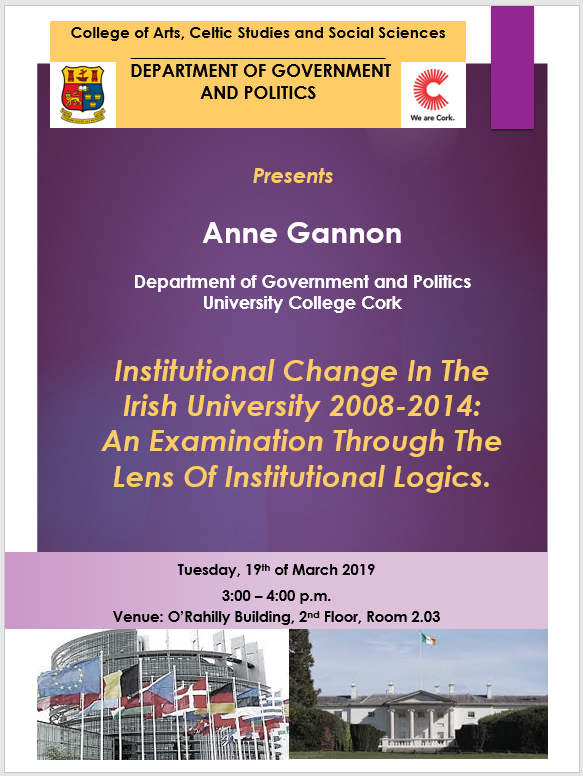
Institutional change is an important research area in the context of the evolution of the Irish university sector.2008-2014 was an eventful period in bringing about changes within the sector.
Drivers of transformation led by the state during this time arose from two distinct sources; developments in government policy within the university sector and the impact of the economic recession. This study focuses on institutional change within the Irish university at both meso level where the academic discipline is located, and the micro levels where the experiences of individual academic professionals are examined. Institutional logics comprise the theoretical lens used in this study. In analysing institutional change three specific institutional logics are identified and examined; representing the societal sectors of the state (the government logic), the business corporation (the corporate logic) and the academic profession (the professional logic).
Dr Anthony Costello (UCC), "Citizens’ Dialogues on the Future of Europe: Why they are flawed and how they can be improved".
The 21st century has brought many challenges for the European Union (EU). The first two decades of the new millennium not only proved difficult, but brought into question Europe’s future. On the eve of the Maastricht Treaty, Europeans envisaged the 21st century to be that of the United States of Europe. Today, disaffected by polycrisis, Europeans increasingly look once again toward national sovereignty in search of security.
With the growing dissonance - in parts - between EU citizens and Brussels, European leaders have pledged to listen to their citizens and plan Europe’s future in such a way that best reflects the diversity of citizens’ attitudes and expectations. In turn, Citizens’ Dialogues have been established across the Union to foster a new working relationship between EU citizens and their leaders. Leaders intend to use these dialogues to improve communication and better inform their plans for strengthening Europe’s future - in both form and functioning.
This paper explores Ireland’s Citizens’ Dialogues between 2017 and 2018. Drawing upon theories of deliberative and participatory democracy, the paper examines the structures and operational procedures of the dialogues and critically evaluates their potential for shaping well-informed national preferences on the future of Europe.
Critical of the current methodological practices underpinning Citizens’ Dialogues, the study aims to develop and contribute suggestions that may help strengthen these important democratic fora, not just in Ireland but across Europe, so that the architectural choices and outcomes that European leaders eventually come to make are better-informed and best reflect the complexity and diversity of public expectations across the Union.
Luke Foley (UCC), "Selective exposure in politically motivated Irish voters: The liberal/ conservative divide."
Mr Luke Foley, a Masters by Research student in the Department of Government and Politics in UCC delivered a seminar talk entitled:
Selective exposure in politically motivated Irish voters: The liberal/ conservative divide.
A study looking at how political predispositions affects the behaviours and reactions of individuals when faced with political news sources.
Does the social left react differently to the social right in how they expose them self to the news?
Dr Andrew Cottey (UCC), "Europe’s Long Peace: Robust, Contingent or Fragile?"
This paper will explore prospects for peace – especially great power peace – in Europe, in light of competing theoretical perspectives and evidence from the three decades since the end of the Cold War. In terms of great power relations, the period since 1945 is one of the longest, in modern European history - borrowing from John Lewis Gaddis we may describe this as Europe’s long peace. This paper will argue that Europe’s long peace should be understood as two distinct sets of relations: the peace within the Western security community and the relationship between the West and Russia. The paper will argue that peace within the Western security community is underpinned by a very wide range of factors: this peace is unlikely to break down and should be viewed as robust. In contrast, the relationship between the West and Russia since the end of the Cold War has never been one in which war has moved entirely off the map of political possibilities. Nonetheless, even in the Russian-Western relationship important factors militate against war: peace the two sides should be viewed as contingent rather than fragile.
Dr Conor Little (University of Limerick), "Constraints on principals and ministerial stability: a cross-national analysis".
Principal-agent (PA) theory has underpinned the growing literature on ministerial careers. Many of the expectations to which PA theory gives rise relate to the institutional context in which principals (prime ministers and party leaders) hire and fire their agents (ministers). Although it is widely accepted that institutions structure the chain of delegation and accountability in which ministerial careers are embedded, broad cross-national studies of the effects of those structural factors on ministerial stability have been rare. One important hypothesis to which PA theory has given rise concerns constraints on principals: the greater those constraints, the greater is ministerial stability.
This paper examines the effects of institutional and quasi-institutional constraints in 33 parliamentary and semi-presidential democracies on the duration of more than 5,000 ministerial spells in government. It focuses on the risk of individual exit from the cabinet (resignation, dismissal, and losing eligibility for office) using a competing risks framework. Consistent with the idea that constraints on principals make ministers more durable, it finds that ministers are more durable in semi-presidential systems and when principals are confined to selecting their ministers from parliament, while they are less durable when the effective pool of candidates for ministerial office is larger and in a surplus majority and caretaker governments. However, the results suggest that ministers in coalitions and minority governments are not any more durable than ministers in single-party and majority governments, respectively, contrary to both theoretical expectations and existing findings. Finally, it shows that, contrary to initial expectations, the risk of individual exit from cabinet falls as the next scheduled election approaches; it suggests some reasons why this might be the case. The results can inform the development of institution-specific hypotheses on political careers at the apex of representative politics.
Professor Brenda Murphy (University of Malta), "patriarchal media landscapes and the embodiment of the self: lookism and the politics of appearance"
The media produces particular versions of the world. It also produces particular versions of gendered bodies. These portrayals produce and reproduce a particular ideology from which there is no escape (Horkheimer & Adorno). The scripts for our embodiment are upheld by numerous mechanisms or pillars that support dominant (in this case patriarchal) ideologies. For Althusser, the media is one of those pillars.
Our bodies constantly ‘appear’ and how we ‘appear’ matters. Our experiences of ‘appearing’ and ‘being’ in our bodies is a gendered experience. The process of appearing and ‘being looked at’ are complex and deeply rooted in our gendered world. On any given day, place or space it is easy to locate the ‘striptease culture’ (McNair) that has grown and become mainstream, as images of female bodies become hypersexualised (Connell; Kimmel, Hearn & Connell), commodified (Bordo), produced and reproduced (cosmetically and technically) into spectacles of unattainable ‘beauty ideals’ (Wolf) and ‘perfect bodies’.
The impact of this image production and image consumption is broad: poor self-esteem, a producing of the self as a mediated ‘object’ (Kilbourne), poor and damaged expectations for self and other, damaged relationships, damaged selves and damaged bodies. Culminating in a reinforcement of misogynistic values around women as devalued objects. The media, through its patriarchal production and portrayal of bodies, shapes, fuels and is actively and wholly culpable in producing and reinforcing damaging gender politics. This aids the gender inequality that radiates out from and is the veritable underpinning of patriarchy.
This lecture offers a critical view of gender studies with an underpinning of cultural studies and its contribution to social wellbeing. It draws on contemporary Irish, Maltese, and Greek media portrayal of women and connects those moments of portrayal and representation with literature around patriarchy and embodiment.
Professor Maura Conway (DCU), "Europe’s Online Extreme Right: A Snapshot of 2016 Versus 2018 Activity".
This paper seeks to measure the impact of Twitter's account take down activity via comparative analysis of a selection of extreme right users from across the European Union’s (EU) 28 member states over a five-day period in 2016 and again in 2018. In particular, the research inquired into the level of take down of accounts between 2016 and 2018, the nature of the accounts removed, and whether the take downs resulted in a decrease in hateful content production and distribution among the selected users and their networks or not.
Overall, analysis of the account take downs, tweet content, interactions, and out-linking activity of the selected users showed that while well over half of the accounts in our 2016 dataset had been removed by Twitter by 2018, the tenor of the online conversation had not appreciably changed and hateful content was still being widely produced and circulated.
Dr Huw Bennett (Cardiff University) and Dr Edward Burke (University of Nottingham), "The British Army in Northern Ireland: Understanding Strategy and Civil-Military Relations"
Preventing civil war: how the British Army's strategy of containment produced escalation in Northern Ireland, 1966-75, Dr Huw Bennett
The British Army's part in the Northern Ireland conflict in the early 1970s has been recounted as displaying colonial-style brutality, political misdirection, or suffering at the hands of irrational hatreds. Presenting findings from his forthcoming book on the Army's strategy up to 1975, Huw Bennett will argue that these old frames are redundant for understanding how military power effected the conflict's changing character. The talk will emphasise the ability of soldiers to perceive local political dynamics and to act with subtlety in lowering tensions, especially in Catholic areas. By contrast, senior officers and government officials came to view the so-called 'Protestant backlash' with apprehension. The desire to avoid conflict with supposedly fearsome loyalism resulted in a pre-emptive attack on the IRA in summer 1970 before the newly-minted Provisionals had garnered much support. This was done, paradoxically, as a calculated move to protect Catholics from a wave of sectarian assaults. Worst-case scenario thinking, where near-genocidal civil war filled the imagination, repeatedly drove the British Army to concentrate on crushing Republicanism, regardless of the effects on ordinary Catholics, in the mistaken belief that doing so would make loyalist violence disappear. By 1974, with power-sharing in tatters and anything resembling victory an impossible dream, senior officers looked for ways to minimise the Army's commitment to Northern Ireland. But some elements in the Army would always struggle to accept the idea that their mission should be anything other than annihilating the IRA.
Dr Huw Bennett, FRHistS, Reader in International Relations, School of Law & Politics, Cardiff University
The British Army in Northern Ireland: Combat, Cohesion and Deviancy, Dr Edward Burke
In this paper, Edward Burke will argue that British Army small infantry units enjoyed considerable autonomy during the early years of Operation Banner and could behave in a vengeful, highly aggressive or benign and conciliatory way as their local commanders saw fit. The strain of civil-military relations at a senior level was replicated operationally – as soldiers came to resent the limitations of waging war in the UK. The unwillingness of the Army’s senior leadership to thoroughly investigate and punish serious transgressions of standard operating procedures in Northern Ireland created uncertainty among soldiers over expected behaviour and desired outcomes. Mid-ranking officers and NCOs often played important roles in restraining soldiers in Northern Ireland. The degree of violence used in Northern Ireland was much less than that seen in the colonial wars fought since the end of World War II. But overly aggressive groups of soldiers could also be mistaken for high-functioning units – with negative consequences for the Army’s overall strategy in Northern Ireland
Dr Edward Burke, Assistant Professor in International Relations, University of Nottingham, and author of An Army of Tribes: British Army Cohesion, Deviancy and Murder in Northern Ireland (Liverpool: Liverpool University Press, 2018).
Dr Niall Dunphy (UCC), "The Art and Mechanics of Grant Writing".
Whether seeking funding for a fellowship or a large-scale research collaboration, grant-writing is a time-consuming, frustrating, albeit necessary component of an academic career. Perceived by many as time away from the ‘real work’ of research and teaching, the process of developing and writing proposals may seem like a daunting proposition.
This seminar will explore approaches to successful proposal writing, highlight common pitfalls and challenges, and consider the various resources available to the grant writer.
Dr Niall Dunphy has a track record in writing successful (and unsuccessful) proposals for multidisciplinary research funding.
Drawing on his experiences as an applicant to National, European and inter-governmental programmes, this talk will consider the proposal process from project ideation through to proposal submission.
Eoghan O'Carragain (UCC), "Fair Data Management"
Dr Philip Murphy (UCC), "Are We There Yet or Don't Even Go There: Voting Age and Vote Efficacy in the Republic of Ireland".
The age of voting entitlement has lowered in some European states in the past decade. Austria (2007) and Malta (2018) lowered to 16 for all national elections. In 2016, Greece lowered it to 17. Other states grant voting entitlement to 16 year olds in regional or local elections; United Kingdom, Germany, Switzerland, Estonia, and Norway. In the Republic of Ireland, the issue has gained traction in legislative discussion. In 2010 a Joint Oireachtas Committee on the Constitution recommended lowering it to 17. In 2013 the Convention on the Constitution recommended lowering it to 16. While accepting this recommendation, the then government changed tack on holding a referendum in its tenure. The current government indicates it is on the agenda for 2019, with many opposition parties (The Green Party, Sinn Féin, The Labour Party, Fianna Fáil) in favour. However, the current electorate appear resistant to such a change (Amárach Research, 2017).
In literature and discussion on voting age, a key consideration is whether the newly enfranchised will avail of their vote. Advocates suggest that lowering the age of entitlement would boost long term engagement. They cite greater opportunities for voter education at a time of residential stability. Opponents suggest that it would accentuate abstention due to the low salience of political/electoral matters among adolescents. Based on a survey of 16-17 year olds (n 750), this paper looks at the value placed on voting as a means of political participation by those who would gain it (i.e., vote efficacy). It assesses if the current lack of entitlement is a source of disempowerment, and the appetite for lowering voting age among the cohort. These considerations are particularly relevant at a time when the current political elite and electorate diverge on the merits of the proposal.
Dr Niall Duggan (UCC), "The Belt and Road Initiative a New Direction for Global Economic Governance".
The Global Financial Crisis of 2007/8 has pushed the People’s Republic of China to the centre of global economic governance. China had long taken the role of a bystander who was bidding it’s time to focus on domestic reforms. But with the crisis of trans-Atlantic capitalism, its economic shockwaves and the establishing of the G20 Summits, the leadership of the Chinese party-state faced increasing pressures to revise its national role conception and act accordingly. Role theory is gaining track as an innovative approach to the study of foreign policies and international relations.
In this paper, we use the concepts of national role conceptions and its domestic as well as external contestation to discuss the on-going revision of the PRC’s policy regarding global economic governance. Taking China’s signature foreign policy initiative, the Belt and Road Initiative (BRI), as a point of reference we interpret China’s new role as a transcontinental great power as a step towards a more active approach to influencing the rules and structures of global financial and economic governance. Yet, the scale and the impact of the BRI raise the issue of whether the BRI can be achieved within the current system of global governance.
Dr Mary C. Murphy and Dr Jonathan Evershed (UCC), "An bhfuil ár lá tagtha? Sinn Féin, Special Status and the politics of Brexit".
Based in part on interviews with senior party members, this paper will interrogate the role of Sinn Féin in Brexit’s complex and vexatious political theatre. It will map and dissect the impact of Brexit on Sinn Féin’s relationship with its former coalition partner – the DUP – the UK and Irish governments, and vice versa.
In particular, we will examine Sinn Féin’s proposals for ‘Special Designated Status’ for the North of Ireland after Brexit. We will ask whether and how these proposals serve to undermine the integrity of the Union, and the extent to which they are intended to do so. We will also investigate the tensions and potential contradictions between the party’s demands for a Brexit which maintains and protects the Good Friday Agreement and its institutions, North-South integration and the all-island economy, and a soft border on the Island of Ireland, and evidence which suggests that a hard Brexit (and particularly a hard border) represent the best chance in a generation of achieving a united Ireland.
Thus, we aim to offer some conclusions as to the potential long-term impact of Brexit on the Irish Republican project and on the question of Irish Unity.
Department of Government & Politics
Roinn Léann an Rialtais agus na Polaitíochta
Contact us
2nd Floor, Block B, O'Rahilly Building, University College Cork, Republic of Ireland,

